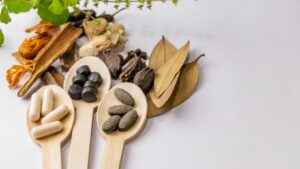In the vast realm of natural health solutions, medical herb seeds hold a significant place. They’re the tiny powerhouses of potential, poised to sprout into plants that can bring about a bounty of health benefits. From ancient times to modern medicine, these seeds have been recognized for their potent healing properties.
Whether you’re a seasoned herbalist or just beginning your journey into the world of medicinal plants, understanding the role of these seeds is crucial. They’re not just the genesis of a plant’s life, but also a source of concentrated nutrients and therapeutic compounds.
Join us as we delve into the fascinating world of medical herb seeds, exploring their diverse uses, health benefits, and how to cultivate them in your own backyard. It’s a journey of discovery that could change the way you view healthcare and wellness.
Medical Herbs Seeds
 Medical herb seeds offer numerous benefits due to their unique blend of health-promoting elements. These advantages extend beyond the realms of nutrition to therapeutic uses in traditional medicine, placing these seeds as valuable assets in the path of natural health and wellness.
Medical herb seeds offer numerous benefits due to their unique blend of health-promoting elements. These advantages extend beyond the realms of nutrition to therapeutic uses in traditional medicine, placing these seeds as valuable assets in the path of natural health and wellness.
Medical herbs seeds pack a punch in terms of nutritional content. They’re rich in dietary fiber, acting as a catalyst for digestion and overall gut health. Additionally, they’re an incredible source of Vitamins, such as Vitamin A and C, known for their antioxidant properties. Furthermore, the presence of essential minerals, such as magnesium, potassium, and calcium, aid in the optimal functioning of various body systems. Greater consumption of these seeds, therefore, translates into improved overall health.
Some specific benefits include improved digestion, enhanced immune function, and a reduced risk of chronic diseases. For instance, caraway seeds show potential in reducing heart disease risk due to their fiber-rich content. Similarly, fenugreek seeds exhibit antidiabetic properties and can help regulate blood sugar levels.
Therapeutic Uses in Traditional Medicine
 In the realm of traditional medicine, the usefulness of medical herb seeds is recognized globally. They form a cornerstone in ancient medicinal practices like Ayurveda and Traditional Chinese Medicine.
In the realm of traditional medicine, the usefulness of medical herb seeds is recognized globally. They form a cornerstone in ancient medicinal practices like Ayurveda and Traditional Chinese Medicine.
Chia seeds, hailed for their anti-inflammatory properties, are commonly used in remedying joint pains and stomach discomfort. Flaxseeds, rich in Omega-3 fatty acids, have proven effective in managing symptoms of heart disease and other cardiovascular problems.
From treating respiratory issues to managing mental health, these seeds, small in size, carry the potential for substantial therapeutic benefits. They not only aid in alleviating symptoms of various health conditions but also contribute to disease prevention. Through the incorporation of these seeds into daily diets, individuals can harness nature’s bounty for improved wellness and balanced health.
Popular Medical Herbs Seeds and Their Uses
 This section spotlights certain medical herb seeds renowned for their significant therapeutic values and versatility. Turmeric seeds yield the golden spice, turmeric. This spice, rich in a compound called curcumin, exhibits potent anti-inflammatory features. As described in a study by Universities of Arizona and Kansas, curcumin helps lower inflammation by controlling biochemical pathways in the body. In addition, it aids in reducing the risk of disorders like arthritis, heart disease, and Alzheimer’s disease.
This section spotlights certain medical herb seeds renowned for their significant therapeutic values and versatility. Turmeric seeds yield the golden spice, turmeric. This spice, rich in a compound called curcumin, exhibits potent anti-inflammatory features. As described in a study by Universities of Arizona and Kansas, curcumin helps lower inflammation by controlling biochemical pathways in the body. In addition, it aids in reducing the risk of disorders like arthritis, heart disease, and Alzheimer’s disease.
Chia Seeds for Heart Health and Weight Management
Chia seeds, native to Central America, are a remarkable source of fiber and omega-3 fatty acids. A 2019 study attests to chia seeds’ abilities to promote cardiovascular health and facilitate weight loss. Thanks to their high fiber content, these seeds make one feel full for longer, curbing overeating, while polyunsaturated fats help maintain heart health.
Flaxseed: A Powerhouse of Omega-3 Fatty Acids
Flaxseeds, bearing a reputation as a nutritional powerhouse, pack a considerable amount of Omega-3 fatty acids. A 2013 report from the Journal of Food Science and Technology emphasizes the role of flaxseeds in lessening inflammation and lowering heart disease risk. Omega-3 in flaxseeds helps to lower harmful LDL cholesterol levels, promote healthy skin and hair, and maintain optimal brain function.

